Search
Remove Ads
Advertisement
Summary 
Loading AI-generated summary based on World History Encyclopedia articles ...
Search Results

Definition
Han Dynasty
The Han Dynasty (202 BCE - 220 CE) was the second dynasty of Imperial China (the era of centralized, dynastic government, 221 BCE - 1912 CE) which established the paradigm for all succeeding dynasties up through 1912 CE. It succeeded the...

Article
Achievements of the Han Dynasty
The achievements of the Han dynasty (206 BCE - 220 CE), often regarded by scholars and the ancient Chinese themselves as the golden era of Chinese culture, would have lasting effects on all who followed, particularly in the areas of government...
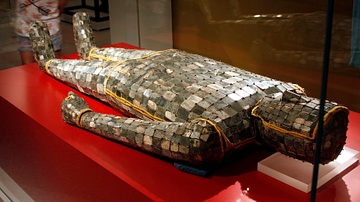
Article
The Art of the Han Dynasty
The art of the Han dynasty (206 BCE - 220 CE) of ancient China is characterised by a new desire to represent everyday life and the stories from history and mythology familiar to all. The arts were fuelled both by a political stability with...

Image
Han Dynasty Farm Model
An unglazed model of a farmyard, Han Dyansty, Eastern Han, 25-220 CE. (Museum of Asian Art, Corfu)

Definition
Ancient China
Ancient China produced what has become the oldest extant culture in the world. The name 'China' comes from the Sanskrit Cina (derived from the name of the Chinese Qin Dynasty, pronounced 'Chin') which was translated as 'Cin' by the Persians...
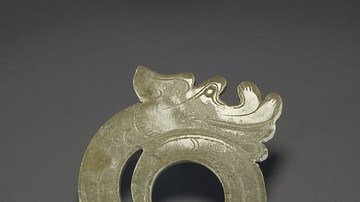
Image
Han Dynasty Jade Dragon
A carved jade dragon. Han dynasty, 2nd-1st century BCE.
The British Museum, London.

Image
Han Dynasty Sword
A Han dynasty iron sword and scabbard with wood and lacquer decoration, China, 2nd century BCE. (British Museum, London)
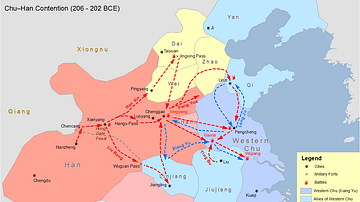
Definition
Battle of Gaixia
The Battle of Gaixia (202 BCE, also known as Kai-Hsia) was the decisive engagement of the Chu-Han Contention (206-202 BCE) at which Liu Bang (l. c. 256-195 BCE), from the State of Han, defeated Xiang Yu (l. 232-202 BCE) of the State of Chu...
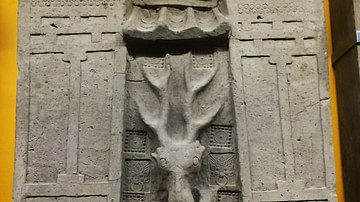
Image
Tomb Entrance from Han Dynasty China
Until about the 2nd century BCE, Chinese tombs featured chambers made of heavy wooden logs. Thereafter, tombs were made of stone and brick. This stone-made example from the Han Dynasty (206 BCE-220 CE) makes clear that the tombs of the wealthy...
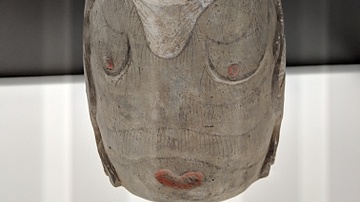
Image
Bear-Shaped Jar from the Han Dynasty
A jar in the shape of a bear, Shaanxi / Henan Region, China. Western Han Dynasty, 2nd/1st century BCE. Exhibited in Museum Rietberg, Zurich, Switzerland.